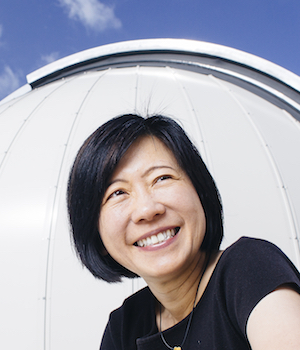Lunch @UCBerkeley with Chung-Pei Ma – Merging galaxies and supermassive black holes
Lunch @UCBerkeley with Chung-Pei Ma – Merging galaxies and supermassive black holes
DOWNLOADABLE GUIDE TO SUNDAY EVENTSThe Milky Way Galaxy – like most, if not all galaxies – contains a massive black hole at its core. Ours weighs approximately 4 million solar masses, but what explains the large number of galaxies that have cores weighing billions of solar masses? Did they form that way, or are they the product of galaxy mergers? That’s one question Chung-Pei Ma is asking through her Massive Survey, a study of the most massive galaxies in the local universe. If these supermassive black holes result from galaxy mergers, some massive galaxies must have two black holes at the center – a black hole binary – prior to merging. Now, astronomers may finally be able to detect these binary massive black hole mergers, which should produce nanosecond glitches in the precisely timed flashes of millisecond pulsars. A proposed Evolved Laser Interferometer Space Antenna, or eLISA, is designed to specifically detect gravitational waves produced by the merger of massive black holes. Ma will discuss the formation of massive black holes in a dark-matter dominated universe, and how the theories about mergers and the formation of supermassive black holes can be tested. Visit Ma’s website, http://w.astro.berkeley.edu/~cpma/, for more information.
Registration is required.

